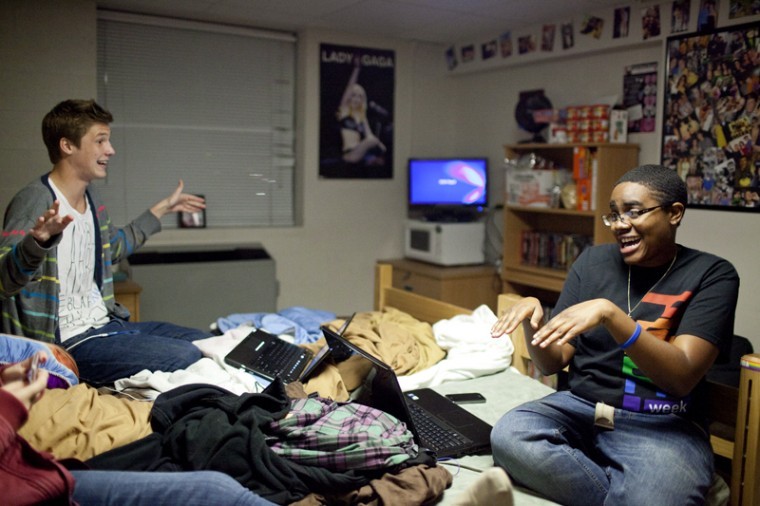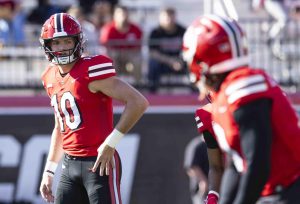L is for Lesbian: Student copes with others’ reactions to her sexual orientation
December 2, 2011
Three.
That is the number of churches Mariah Yelverton and her family have been kicked out of since she came out as a lesbian.
The Louisville freshman said she came out during her freshman year of high school and since then has finally felt truly comfortable in her own skin despite others’ reactions.
“I can now do what I want and be myself,” Yelverton said. “Somebody is attracted to everyone, and I just happen to be attracted to girls.”
In addition to her newfound confidence, Yelverton said she was also relieved to be able to dress her own way – in more masculine attire.
“I tend to do pretty mannish things,” she said. “My friends even refer to me as one of the guys.”
Although Yelverton is strong in sexuality, her process of coming out has not been without adversity.
“Sometime people call me a dyke or other names, but I just brush it off,” she said. “I don’t need those people in my life.”
When she first spoke up about her sexual orientation, her mother accepted it, but her father practically disowned her.
“I wasn’t his daughter anymore,” Yelverton said, looking down.
“It was just me,” she added. “I had to go through this by myself.”
Though the self-assured Yelverton said things have been easier since she has been on campus around more open-minded people, she still has worries about the future.
“I already have two strikes against me because I am black and a lesbian,” she said, “and I don’t pay much attention to it now, but I know later, when I go to get a job, people will discriminate against me.”
As a military leadership major, Yelverton said she is planning on joining the Army after graduation. Although she was going to join no matter what, she said she is relieved that the “don’t ask, don’t tell” policy has been repealed and she will no longer have to hide her identity.
“There will still be people who aren’t OK with it and I won’t be as open, but I also won’t have to hide it,” she said.
Yelverton added that she had a difficult time with her sexuality when she lived in Alabama for a year, because she wasn’t accepted for who she was.
“I was black and gay in the Bible Belt and shit like that just doesn’t fly,” she said.
The freshman wears a gold cross around her neck and said she hasn’t taken it off for six years, but holds on to it because it was a gift from her dad, not for religious reasons.
“I think Christians are extremely hypocritical,” she said. “They say God forgives, but then turn around and say God hates gays.”
She has even had strangers tell her that she is going to hell, but the worst incident of intolerance was working with a woman who changed her work schedule as soon as they met.
Yelverton doesn’t let discrimination get to her.
“I really just don’t care,” she said. “You can love me or hate me.”
However, she noted not all people take hateful actions or words so easily.
“Some react negatively instead of being positive about who they are,” she said as she held a purple ribbon, which represents gays and lesbians who have committed suicide.
She is in the Student Identity Outreach (SIO) club, whose purpose is to support those who are coming out or having a difficult time with their sexuality.
Nashville senior Lydia Dowell is the president of SIO and is straight, but said she has always been a supporter of social justice for LGBTQs (Lesbians, Gays, Bisexuals, Transgenders and Questionings).
“This is a social justice issue,” Dowell said, “and like the Civil Rights Movement, enough people have to get behind this and rise up to make a change.”
In the meantime, SIO is there for support.
“The organization is an outlet for campus’ LGBTQs to be able to meet each other and talk and to know they aren’t alone,” she said, noting how some people are rejected by their own families after coming out. “It’s important to have a strong support group.”
Louisville freshman Landon Shull agreed it is important to be around people who understand.
“Coming out takes years to do and it’s hard no matter what, but it gets better,” he said, “especially around people who are cool about it.”
Shull said he thought people are more mature and accepting now, but that they still need to learn more about LGBTQs.
Yelverton also said more awareness should be raised about the gay community.
“Nobody wants to know, but people need to,” she said. “That is why I did this interview, so people can read about this and see that I’m like everyone else.”













